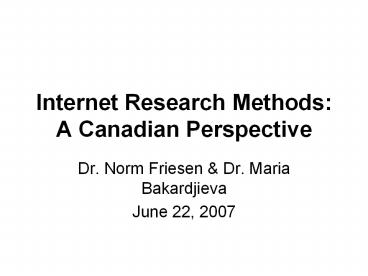Internet Research Methods: A Canadian Perspective - PowerPoint PPT Presentation
1 / 16
Title:
Internet Research Methods: A Canadian Perspective
Description:
Title: Exploring Collaborative Learning Environments: A Canadian Perspective Author: Norm Friesen Last modified by: Norm Friesen Created Date: 4/29/2006 7:53:28 AM – PowerPoint PPT presentation
Number of Views:161
Avg rating:3.0/5.0
Title: Internet Research Methods: A Canadian Perspective
1
Internet Research Methods A Canadian Perspective
- Dr. Norm Friesen Dr. Maria Bakardjieva
- June 22, 2007
2
Goals
- To introduce students to existing approaches in
Internet research combining theoretical,
epistemological and methodological aspects and
issues, - Emphasis on the ways that these have been studied
by Canadian researchers.
3
Schedule (1 of 4)
- June 22
- Introductions
- Course overview
- Introducing the Internet through network
neutrality - Blog access
- Web analytics as Internet research (server
activity) - New Web Technologies
- Qualitative vs. Quantitative research
4
Schedule (2 of 4)
- June 23
- Review technical questions answers
- Online discussion in Canadian research
- Critique "Digital Diploma mills"
- Genre as a way of studying Internet comm.
- Internet Myths
- Critical theory
- Discursive analysis
5
Schedule (3 of 4)
- June 29
- Review of main principles of social research
- The research process
- Paradigms in social theory
- Methodology and methods
- The Internet as an object of research
- Choosing a theoretical approach
- delimiting the research object
- asking research questions
- choosing a methodology
- designing a study
6
Schedule (4 of 4)
- June 30
- Research methods and their Internet counterparts.
The researcher-respondent relationship on the
Internet. - Virtual communities and their ethnographies
principles and examples - The ethics of virtual research.
- Network Analysis principles and examples
- Studying Internet Users
- Studying the Internet in everyday life
7
Readings (1 of 2)
- Hine, C. (2005). The Virtual Objects of
Ethnography. In Hine, C. (Ed.) Virtual Method
Issues in Social Research on the Internet.
Oxford Berg. - Kivits, J. (2005). Online interviewing and the
research relationship. In Hine, C. (Ed.) Virtual
Method Issues in Social Research on the
Internet. Oxford Berg. - Mackay, H. (2005). New connections, familiar
settings issues in the ethnographic study of new
media use at home. In Hine, C. (Ed.) Virtual
Method Issues in Social Research on the
Internet. Oxford Berg.
8
Readings (2 of 2)
- Rutter, J. Smith, G. W. H. (2005). Ethnographic
presence in a nebulous setting. In Hine, C. (Ed.)
Virtual Method Issues in Social Research on the
Internet. Oxford Berg. - Schneider, S. M. (2005). Web sphere analysis an
approach to studying online action. In Hine, C.
(Ed.) Virtual Method Issues in Social Research
on the Internet. Oxford Berg. - Orgad, S. (2005). From online to offline and
back moving from online to offline relationships
with research informants. In Hine, C. (Ed.)
Virtual Method Issues in Social Research on the
Internet. Oxford Berg.
9
Recommended Readings (1 of 3)
- Bakardjieva, M. (2005). Researching the Internet
at Home. Chapter 3 from Bakardjieva, M.,
Internet Society The Internet in Everyday Life.
London Sage. - Bakardjieva, M. (2003). Virtual togetherness an
everyday-life perspective. New Media Society.
253 291313. - Ess, M. (2002). Introduction. Ethics and
Information Technology 4 177188, 2002.
10
Recommended Readings (2 of 3)
- Garton, L., Haythornthwaite, C. Wellman, B.
(1998). Studying On-line Social Networks. In
Jones, S. Doing Internet Research Critical
Methods and Issues for Studying the Net. London
Sage. - Hurrell, C. (2006, January 10). Civility in
Online Discussion The Case of the Foreign Policy
Dialogue. Canadian Journal of Communication
Online, 30(4). Available http//www.cjc-online.
ca/viewarticle.php?id1529.
11
Recommended Readings (3 of 3)
- Markham, A. N. (2004) "The Internet as Research
Context" in Qualitative Research Practice,
(Seale, C., J. F. Gubrium, D. Silverman and G.
Gobo eds) Sage Publications, London Thousand
Oaks, Calif., pp. xix, 620 p. http//faculty.uvi.e
du/users/amarkha/writing/Seale.htm - Stern, S.R. (2003). Encountering distressing
information in online research a consideration
of legal and ethical responsibilities. New Media
Society. 5(2)249266 - Wittel, A. (2000) Ethnography on the Move From
Field to Net to Internet. Forum Qualitative
Social Research Volume 1, No. 1 2000, January.
In Englishhttp//www.qualitative-research.net/fq
s-texte/1-00/1-00wittel-e.htm Auf Deutsch(!)
http//www.qualitative-research.net/fqs-texte/1-00
/1-00wittel-d.htm
12
Canadian Context Internet Studies Emphases
- Emphasis on
- Bridging geographical distances
- Federal provincial government support for this
- Strong connections between research and economy
pragmatic - Emphasis on politics, suspicion of American
dominance
13
Canadian Perspective
14
Canadian Context Geography
- Canada
- Size 9,984,670 km²
- Persons per km² 3.3
- Austria
- Size 83,871 km²
- Persons per km²97
15
CANARIE
- CAnet 4 optical Internet research and education
network. - interconnect various provincial research
networks, and through them universities, research
centres, government research laboratories,
schools, and other
16
CAnet4
A a































